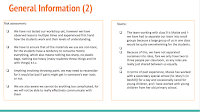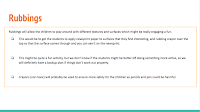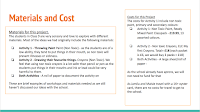When I was given the brief for this community project, I was hoping to be put into the group visiting the hospice as I wanted to take part in a community group that would result in a humbling experience. Looking back on how much my community group has done and the school that we worked with, I couldn't be happier. I've enjoyed working at Redgates so much and it's been such an amazing and humbling experience. When we found out that the previous organisation pulled out it was upsetting at first but I'm grateful for the group I got put in as well instantly started working on finding a new one in which we did and I'm so happy it was Redgates. I feel like throughout this project, I've learnt so much more than I would've if I was put in a different community group. I've learnt how to conduct a proposal, I've learnt how to work with children with different abilities and learning difficulties, I've learn more about sign language and cognitive age and I've also learnt how to plan and change around innovative ideas etc.
This project has been really humbling and I feel I've come a really long way from how I felt in the beginning. I was worried as at first since we didn't have an organisation to work with but once we got the ball rolling it became more enjoyable. I feel like it would've been even better if things were changed such as if we conducted two workshops instead of one just so that it would be easier to evaluate what works well and what doesn't. Also things such as having more opportunities to bond with the kids although they got used to us a lot easier. I also think that things would've been better if we bonded with the teachers and teaching assistants as I feel there was a lack of communication between us and them as on the workshop day, they seemed like they didn't know what we had planned to teach the children and as it got a bit messy, one of them weren't happy with the session due to the mess, so I do think things would've been a lot better if the communication between us as students and the teaching assistants was stronger. More time is another thing I feel was needed as they are learning disability, it was really hard to convey the message of drawing to the kids in just one session without breaking routine or schedules as they work at cognitive ages, so that alone was hard to communicate. Other than that, things went really well. I feel that going to observe classes before teaching a session was really helpful as we got to see how the kids work and what they can and can't do and this played a massive role when planning ideas and proposals as we had to take many things into consideration, and I feel observing classes beforehand was really beneficial.
Throughout this whole project, thankfully we haven't received bad feedback and I'm really happy with that as I feel all the preparation that me and Maisie carried out for Class 9 such as looking at research on cognitive ages and planning the workshops around that to suit the children and things such as trying out the activities before teaching the class to see what worked well and really benefitted us when it came to teaching the class. This is the feedback we received quoted from a previous blog post:
- One by one - she advised us that as the workshops can get really messy, which is great, she gave us the advice that if we wanted to keep things a bit more clean, we should get a student to take part one by one to keep things more controlled. I thought about doing this, but after observing the art class last time, the children get restless really easy and behavioural issues start to show and I wanted to avoid that, but I will still take this into consideration if there is a next time.
- Health and Safety - To take health and safety into consideration more, especially for my workshop as the paint was really slippery and the students did slip a lot but thankfully no injuries occurred. I will definitely look into health and safety a lot more as I only looked into what was safe for them and what wasn't in terms of materials and not surrounding.
- Enthusiastic - She said I interacted with the children well and enforced the enthusiastic language with them well so like emphasising the tone of voice and really engaging well with them. This is something I took into consideration massively as after observing the classes earlier on in the year, I saw that they respond well when spoken to enthusiastically so I'm happy I was able to give off that good energy.
Working with Redgate is a completely different experience than if I was to work with the Selhurst Children Centre for example. Although both organisations are working with children, there are so many different things to consider such as health and safety rules would be different slightly as both sets of children work at different abilities and communication would be completely different. Comparing the two makes me wonder what would my experience be like if I worked with a different community group and it just makes me value the experience even more.
My final thoughts on this whole project is that I'm extremely happy and proud of my group because although we were a group, we had to be split into small groups of two and a four as the children couldn't handle all of us in one classroom. A hiccup like that and the fact we found this school completely ourselves, enforces how hard we've worked. I also think that for working with people that aren't in our friendship groups, we all did really well and communication was good throughout the whole project. I feel like for all of us, Redgate School has left a really nice impression on us and hopefully we've left a really good impression on them. I'm so happy with the result of my workshop and surprised at how well it went as I only conducted one due to time. All in all, this experience has been amazing and I could not be happier with the result.






















